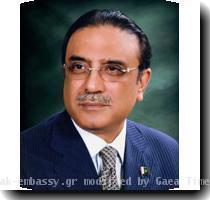UN to temporarily move some international staff out of Pakistan for security reasons
By APThursday, December 31, 2009
UN to move some staff out of Pakistan for safety
ISLAMABAD — The United Nations plans to temporarily relocate some of its international staff outside of Pakistan for security reasons following attacks that have killed at least 11 of its personnel in the country this year, a spokeswoman said Thursday.
The move comes about two months after the U.N. decided to suspend long-term development work in volatile areas near the Afghan border. Both decisions could complicate international efforts to win hearts and minds in Pakistan, where a raging Taliban-led insurgency has killed over 500 people in the past two and a half months.
Around 20 percent of the U.N.’s expatriate workers will either leave the country for six months or be relocated to safer areas within Pakistan, said spokeswoman Ishrat Rizvi. The world body will reevaluate the security situation in six months to determine when the staff can return, she said.
“We will review programs and projects and we will see whether we need to bring back those international staff members and which programs are to resume,” Rizvi told The Associated Press.
She declined to specify how many international employees and which programs will be affected by the decision. No projects are being shut down, “but some of the programs for the longer duration may be suspended for a while,” said Rizvi.
However, a United Nation officials in New York said U.N. security managers were seeking a reduction of up to 30 percent of international staff, although the actual number would depend on negotiations with the various U.N. agency heads.
The official spoke on condition of anonymity because security details and negotiations are confidential.
The U.N. says it employs about 250 international and 2,500 national staff in Pakistan.
In early November, the U.N. announced it was suspending long-term development work in Pakistan’s tribal areas and its North West Frontier Province. It said it would reduce the level of international staff in Pakistan and confine its work to emergency, humanitarian relief, and security operations, and “any other essential operations as advised by the secretary-general.”
The U.N. has continued to work with the Pakistani government to determine how to realign its programs to focus on more short-term needs because of the deteriorating security situation, said Rizvi.
“We are focusing more on the more urgent programs and needs according to the government’s priorities and needs,” she said.
The U.N. has been deeply involved in helping Pakistan deal with refugee crises resulting from army offensives against militants. But its personnel have been targeted in a string of attacks, including a bombing by the Pakistani Taliban in early October targeting the World Food Program’s office in Islamabad that killed five people.
Militant attacks on various targets in Pakistan have spiked since mid-October when the army launched a major ground offensive in South Waziristan, the Pakistani Taliban’s main stronghold near the Afghan border. The military has secured much of the territory in the area, but operations continue.
Soldiers raided a hospital used by militants in South Waziristan on Thursday, killing five foreign fighters, intelligence officials said. The troops captured 27 militants, 10 of whom were wounded in a gunbattle that broke out during the raid, they said.
It was unclear whether the troops suffered any casualties, the officials said on condition of anonymity because they were not authorized to talk to the media.
Many militants are believed to have fled South Waziristan to avoid the fighting and have been launching attacks in different areas of the country.
Late Thursday night, two Pakistani intelligence officials said a suspected U.S. drone missile strike in North Waziristan had killed three people. The officials spoke on condition of anonymity due to the nature of their job. No independent confirmation was possible.
Police investigator Chaudhry Shafiq said Thursday that authorities arrested a senior Pakistani Taliban commander who led the group’s network in the key central province of Punjab, where violence has been increasing in recent months.
Khalil Ullah was the mastermind of a market bombing in Punjab’s provincial capital, Lahore, on Dec. 7 that killed 49 people, said Shafiq. He declined to say where or when Ullah was arrested.
The Pakistani Taliban have also claimed responsibility for Monday’s bombing of a Shiite Muslim procession in the southern city of Karachi that killed 44 people, a sign the militants may be escalating their war against the state with a major attack in Pakistan’s commercial hub which it has rarely targeted.
President Asif Ali Zardari has speculated the motive was to trigger sectarian conflict — between majority Sunni Muslims and minority Shiites — that could complicate the government’s battle against the Pakistani Taliban.
The bombing sparked rioting that destroyed buildings and thousands of shops in central Karachi, causing millions of dollars in damage.
Officials initially blamed Shiites in the procession for the rioting but later said it was a planned conspiracy — a stance that may be intended to temper sectarian tensions.
Sunni religious leaders and politicians in Karachi have called for a strike to protest the attack and ensuing violent rampage. They have urged businesses and public transport companies to shut down Friday, a move that could paralyze the city.
Associated Press writers Elena Becatoros in Islamabad, Babar Dogar in Lahore, Ishtiaq Mahsud in Dera Ismail Khan and John Heilprin at the United Nations contributed to this report.


